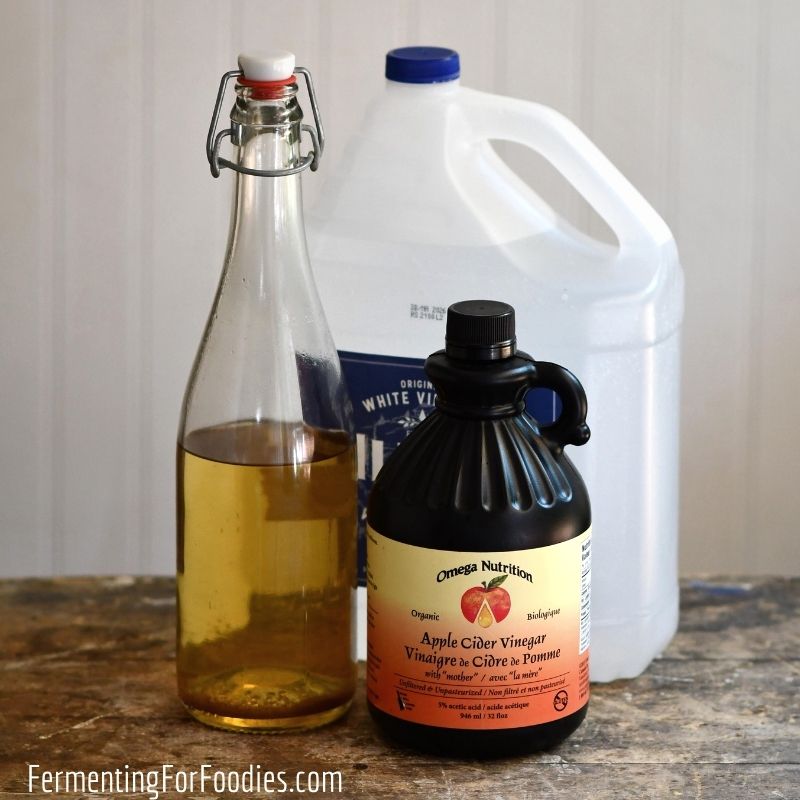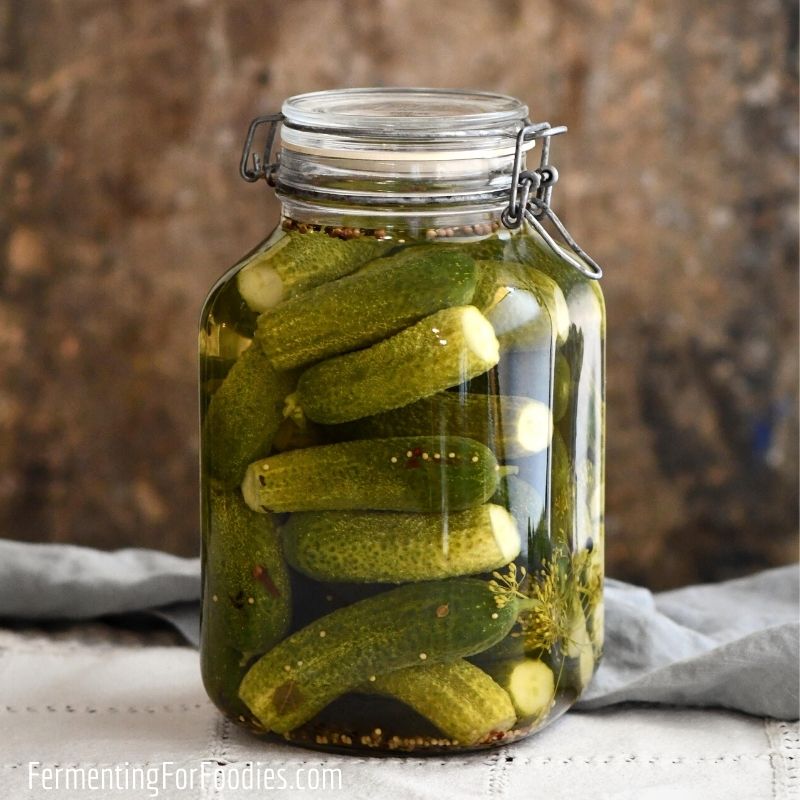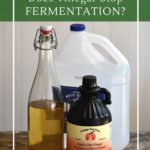Wondering if vinegar will stop fermentation? The answer isn’t a strict “no”. Here’s a guide to adding vinegar to your ferments.

One of the biggest differences between traditional pickling and fermentation is the use of vinegar.
–> In traditional pickling, vinegar is added to the vegetables to prevent contamination by molds, bacteria, and yeasts.
–> In fermentation, the acidity comes from the conversion of sugar into acids by Lactic Acid Bacteria.
So, does vinegar stop fermentation?
The answer isn’t entirely straightforward…
Vinegar does stop fermentation, but only if in concentrations that are high enough to prevent bacterial growth. This is the case with traditionally canned pickles, salsas, and chutneys.
However, just adding a little bit of vinegar to fermented vegetables won’t be sufficient to stop fermentation.
Why would you want to add vinegar to a ferment?
There are few circumstances when adding vinegar to a ferment is actually helpful.
1. For Added Flavor
Sometimes I add vinegar to a ferment for the flavor. Ferments usually end up at a pH of 4.5 to 3.5. Adding a few tablespoons of vinegar gives an added tanginess.
I particularly like adding vinegar to fermented beets. It really helps to balance the earthy sweetness of the beets.
2. To Speed Up The Ferment
Certain lactic bacteria are acid-loving. For example, sauerkraut starts out with a ton of different bacterial cultures, but by day 5, the acid-loving lactic bacteria have taken over.
By adding a bit of vinegar to a ferment, it creates an environment that is ideal for acid-loving bacteria, thus speeding up fermentation time. While fast fermentation isn’t always the goal, it can be helpful in preventing unwanted contamination in a ferment that is going to be stored for a long period of time.
My favorite fermented cucumber pickle recipe uses a little bit of added vinegar to ensure a good, fast ferment.

3. Culture for a Ferment
Cultured (raw) vinegar is perfect as a starter for ferments. Here are a few reasons to consider using vinegar culture:
–> Low sodium: If you don’t want the salt associated with typical fermented vegetables, using ACV allows you to ferment without salt! Check out my salt-free hot sauce and piccalilli.
–> Fruit ferments: Salty-fruit is unusual. Using vinegar allows you to make sweet (or at least not salty) fermented fruit.
–> Condiments: Using vinegar to ferment condiments is a super simple, zero-waste option. Try making fermented salsa, relish, or chutney.
Not all vinegar will work as a starter. Here are a few options:
- Homemade fruit vinegar
- Raw and unpasteurized apple cider vinegar
- Sour and unflavored kombucha is very similar to vinegar



I really enjoy making dill fermented green beans. But they’re never quite Dilly enough for me. Would it be a problem to add pickle brine after the fermentation is done and I’ve put them in the refrigerator.. Would that ruin their refrigerator life ?
I’m guessing that you’re asking about adding commercial pickle brine from vinegar pickles to your fermented green beans? Depending on how much you add, it probably won’t kill the fermentation. I also like a bit of vinegar in my fermented green beans. It just gives them that extra bit of tanginess. So I ferment beans with a small amount of vinegar. Cheers!
Could you gice details on how big a jar you’d put a few tbls of vinegar in and is braggs ACV good enough. It seems to have aa lot of powdery stuff which I imagine is the mother? Tha k’s in advance. I really want to get into this but salt only pickles ha e tasted boring so far.
Braggs ACV is great! I used it for my first ACV culture about 10 years ago… and I’m still using it to make vinegar. 🙂 If you want to use ACV to ferment vegetables, I use at least 1/4 cup in a 1 quart (1L) jar. But sometimes I add more if I want that flavor of vinegar. Though fermenting does make it sour, as you mention, it’s not the same a vinegar…
Great question. I’m going to add the info to my post. Thanks! Emillie
HI Emillie,
do you by any chance know, at what PH an active fermentation stops? I would like to make a hot sauce and add vinegar at the end to stop the fermentation, so I can add sugar to the sauce without it being eaten by the bacteria and restarting the fermentation process…I don’t want to use sugar alcohols for the sweetness and also don’t want to boil/pasteurise the sauce to keep the good bacteria alive…any suggestion would be much appreciated.
Kind regards 🙂
It requires a pH below 4.2 to stop fermentation. That’s probably too acidic for your taste. It is hard to add sugar to something without having it ferment away! When I want to keep something sweet, I stash it in the fridge. That works for 2-3 weeks. For longer than that, I freeze the ferment. In fact, I pretty much always do that with hot sauce anyway! We don’t use it up very quickly, so I freeze it in 1-cup mason jars. Hum… I can’t think of another way to stop fermentation without killing the good bacteria. Cheers!
Thank you so much for your reply 🙂
My PH was 3.6 after adding Mango and I hoped the low PH would not allow any further fermentation, but it continued to ferment (in the fridge). I don’t want to freeze the hot sauce since this would also kill most of the good bacteria. I will now try to add mango at the beginning of the fermentation and add Stevia at the end for sweetness…lets see 🙂
Wow! That’s a pretty low pH… I’m surprised it was still fermenting. I don’t think freezing will kill all the probiotics. I actually use my freezer to keep my cultures alive! I have koji rice (for miso), cheese cultures, and yogurt cultures in my freezer at the moment. I usually don’t keep them for more than 6 months, but they seem to be good for at least that long. Cheers, Emillie
my husband likes really sour pickles, so I have been fermenting cucumbers to sour, then pouring off the brine (I save it to drink lol) and putting the pickles in straight distilled white vinegar, but then I got to thinking that might kill all the probiotics?
Straight vinegar would most likely kill the probiotics. How long do you ferment for? The pickles will get sourer the longer they ferment. I recommend 2 months minimum for sour pickles. Though if your husband likes straight vinegar, then maybe that won’t be enough.
Hi Emillie,
Thanks for your valuable information.
I want make a shrub. Im (obviously) adding acv with the mother and want it to ferment. What is your opinion on that? Do you think the fermentation actually starts or will the fruit just ‘marinade’ in the fruit and sugar added? Hope to get your opinion as my goals is to make a probiotic cocktail 🙂
Hi Lisa, Sorry for the slow reply… for some reason this ended up being flagged as spam (?). Shrubs made with ACV are definitely alive! I make them all the time and can assure you that they will be bubbly, sparkly concoctions. Because I make live shrubs, I recommend following a slightly different process. Any added sugar will only feed the ferment (not sweeten it). So I recommend adding sugar when you’re ready to drink it, not before. Added fruits and other flavors will provide plenty of sugar to feed the ferment.
Here’s my version of a live fermented shrub. 🙂 https://www.fermentingforfoodies.com/how-to-make-a-shrub-drinking-vinegar/ Cheers, Emillie